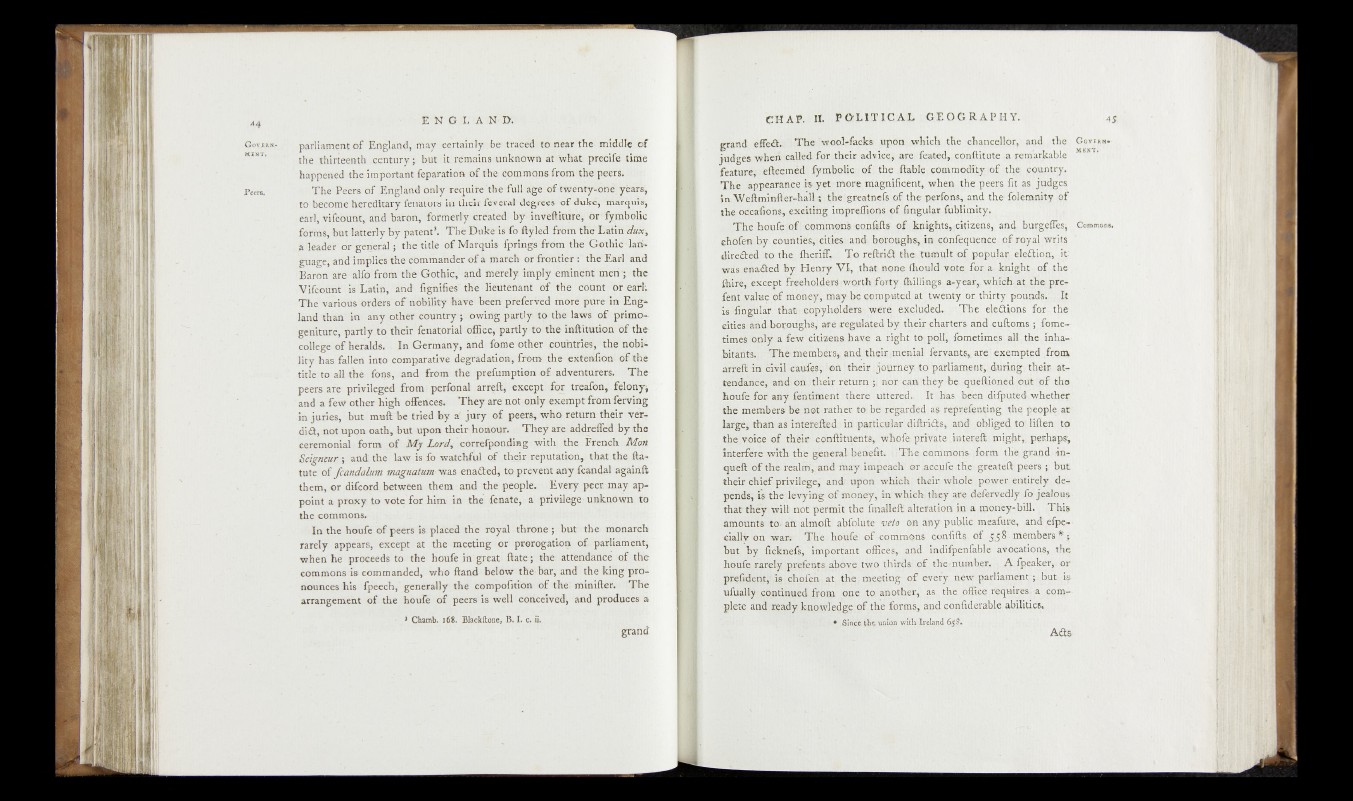
parliament of England, .may certainly.-, be traced to near the- middle o f
the thirteenth .cen tu ry ; b u t. it remains unknown at what precife time
happened the important reparation o f the cornfflqnsfromithepeers. $
Thé Peers of England only' rêqviire the full age of twenty^one' years,
1 o become hereditary fenatqts- in their feveral degrees o f duke', marquis,
earl, viftount,1 and baron,' formerly created» b y inveftiture, o rfymbólic
féïfÉl, but latterly b y patent*. Thé D ukeis fo il-yleÜ' frbm the Latin dux-,
a leader or general; the title bf Marquis fprings from the Gothic lari,
guage; an d im p lie sth e eömmander of a march or frontier the<Earl and
Baron are alfo from the GothïCj^nd merely imply emiriehf'men ; the
T i f f ié ltf ’is Latin, and fignifiésr the Tieuteriant o f itK é 'c b u n t-or earl;
The various orders o f nobility have been preferved more purëdn England
than in any" other country:;| Owing parti y t o th e laws o f 'primogeniture,
partly t o their fenatorial'office^ partly to the inftitution b f 'th e
college o f heralds. In Germany, and fom e ith e r countries',hthe nobi-
lity has fallen into comparative degradation, from th e extenfons o f the
title to all the fons, and from the prefumption of. adventurers, ‘T he
peers are privileged from perfonal arreft, except! fo r treafón, felony,
and a few other high offences. They are not only-exempt from ferving
in juries, but muff be tried by a' ju ry o f peers, who return th e ir yef-
di&, not upon oath, but upon th e ir honour, i They are addreffed by the
ceremonial fp rm y o f M y bard, correfppnding withfi'the .-Èrfen^b: Mon
Seigneur-, and the lawjisTo watchful o f,th e ir jreput4i%n, that the fta-
tute o f fcatidalum magnatum was enadted, to, prev,ent any fcandal againft
them, pr difcord between them arid the people. ■‘Every peer may appoint
a proxy to vote'for h im in the' -fenate, a privilege',unknown to
the commons.
In the houfe of peers is placed th e ro y a l. throne ; h u t th e monarch
rarely appears, except at the meering or! prorogation of^parliament,
when hè proceeds to the houfe in great d a te ; the attendarice o f -the
commons is commanded, who ftand below the-bar, and • the :kirig pronounces
his fpeech, generally the compofition of the: minifies. The
arrangement o f the houfe o f peers is well conceived, and produces a
3 Chamb, 168. Blackftone, B. I. c. ii.
grand
grand effect. The wool-facks upon which the chancellor, and the
judges when called for-their advie'ej are, featec], $pqftitute a remiarjtable
feature^- ëfteemçd fymbolic of the .ffablq eomnjqdijtyv'of tf^e country.
T h e appearance is yet more rriagnifiqent, wjign ,tHe peers fit as judges
ip 'Weftmiufer.hall’iîlbVgrç.aîPefs of thq,per fobs, apd the- foleranity of
the. ocoahons; excUfhg impreffiojns^pf fingqlar fublimity,
The houfe of! commonstqftnfiffs pf Juiïgbt^jCitizfÿrf^ andw burgqffes;
chQ&fpby-counties,sciricSj-and b^ïoô’ghs,;inÆpufgqupriqëîP^ /6 y a ];w’nts
directed rq;the fheriff. To rejlridf {he, tumult o f .popular, eletStiojb.jt
wds^pnadfced by H e n jy (th^t nqpe fbipa|d vote |bra< .^night qfr the
fhire, except freeh'ol^erdjworth fer,ty, fhiyir!gsr(a-year-,; which at the prefect
v alue o f^ a n e a r^ 'w y fe ÿ ©pm put ed, at tw en ty o r thirty pounds. It
is fingular th a treo p y h é ld ër^w q re , excluded. ’.The“ gJjgQ.igns fo ^ th e
cities ândAoçQugh'sj are regulated by their charters and eyftoms ; Sometimes'only
a few*citizens have a right tq- p o ^ fometimqs the inhabitants.!
'Thé.mqmhérs^.andit'hçjHjfpenial fqrvan$s*arq; ejxqmçtgd from
arrfeff in civil 'cauifeS', ;o n : their tjourney tri parliament, during, their- attendance,>*
and5 on’lth e ir return ;l nsor çari'ihey be q ^ f ty ^ ^ s o j i t fpf the
houfé fo r any fefcrihnenfr tJjâfe&yjtçred. ft T ’as, jïÇén ’difp,üted>whether
the members bfe n o f rather to be jë’garc^'Ü^asi re|f|ëf|nting the; peqple-aj
largé, than as interefted in> partit;*)açi<t^iTfsfa®d'.obliged tq> liftentlt.q
thelvoise- o f' their " cdiïfürtqenta* w$$f& private. frit mighty, .perhaps1,
interfere .with the gèn erab he n e fit, f The; éqnl'niqhÇ; if&rrn thq.gijanjf in?
queft !of the-real in la n d may.impeacli' ,®r iac-cufeithq- gr eatqftj pqers ;J but
th e ir Chief privilege^ andriupon which')-their wh^ 1 q-iphwer^û}t ire 1 y , de?
pends; is the |fevyift^of"mondy; ;in which? jhasy are dfifervecjlyiq jqafqtus
that they-'will riot pfermit the fmalIèfÜ âltjdfàtiqtyi^a money-bill. This
amounts' to- an ahnoïh aibfolute rvefrs on a n y puHtic; ;qagafer-q, and^fpe-
cialiÿ :bn~ waK ï h e , houfqj ^ofÿcopiin^ps. d £ T |8 ' -members ? j
but, by fickqefs, imjiqràint and indifponfable jâŸqcât-ions^ the
hqgfp rarely presents above two ffâjHsqpf the-num'l^ej^.h fjlè^êr-, or
prefideryy is^phofen at thq r rif qyeryjjriew^^rlja^ent^hu|>jiy
ufually continued,from one to, ariptber,^as thq^olpce rejquirqsj'a complete
and ready knowledge of^heiqrxn^, an^fiO^ftéfflb^ abilities,^, ,
v * Since the, union with -Ireland dj8« i |
G o v e r n ment.
Commons«
Ai3:&